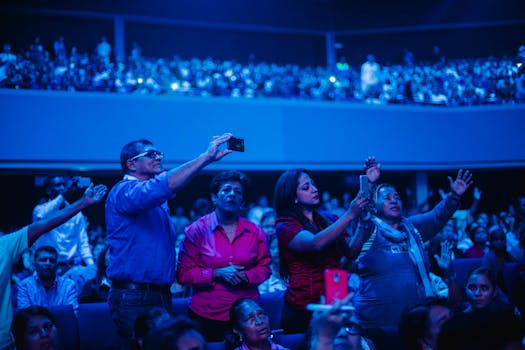Music marketing is an essential aspect of the contemporary music industry. It encompasses strategies and promotions tailored to reach audiences effectively. As artists navigate this dynamic landscape, understanding music marketing becomes crucial for success.
From developing a personal brand to leveraging social media platforms, musicians must consider various avenues. The right approach allows artists to connect with their target audience and build a loyal fan base.
Additionally, the digital age has transformed music marketing. Artists can create and distribute content without traditional barriers. As a result, mastering these techniques can dramatically affect an artist’s visibility and revenue.
The Fundamentals of Music Marketing
Understanding the core principles of music marketing sets the stage for effective promotion. Marketing encompasses numerous strategies and platforms that artists must consider. Each method plays a unique role in shaping how musicians connect with fans.
Firstly, recognizing the importance of branding is essential. An artist’s image should convey their musical style and emotional intent. This consistency across all platforms helps cultivate a recognizable identity.
Furthermore, it’s vital for artists to define their target audience. Knowing who is likely to enjoy their music shifts marketing efforts to a more focused approach. This often leads to higher engagement and conversion rates.
In this digital-first environment, social media platforms are indispensable. They facilitate real-time interaction, allowing artists to share their journey, music, and brand updates. Creative content can engage fans and inspire shares and word-of-mouth promotion.
Finally, an effective marketing strategy incorporates various channels. From streaming platforms to live shows, using multiple avenues broadens reach. Ultimately, understanding these fundamentals lays the foundation for successful music marketing.
Building Your Brand as a Musician
Building a personal brand is a critical aspect of music marketing. This process entails defining who you are as an artist and what you want to convey. A strong brand resonates with listeners and fosters loyalty.
A cohesive visual identity significantly impacts brand perception. Consider elements like logos, color schemes, and typography. Ensure these elements reflect your musical style and message, creating an authentic connection with fans.
Moreover, storytelling is a powerful tool for branding. Sharing personal anecdotes or the inspiration behind your music deepens the emotional connection with your audience. Fans appreciate the human side of musicians, enhancing loyalty.
Engagement with your audience is pivotal. Utilize social media to interact and respond to questions or comments. This two-way communication fosters community and encourages fans to support your work actively.
Lastly, consistency is key to brand development. Regularly update content and maintain a unified message across all platforms. Establishing a reliable presence enhances recognition and reinforces your artistic identity.
Exploring Digital Marketing Strategies
Digital marketing is indispensable for modern musicians. As technology evolves, leveraging it effectively can enhance outreach and engagement significantly. Various strategies exist to help artists navigate this complex landscape.
Firstly, utilizing search engine optimization (SEO) drives website traffic. By incorporating relevant keywords into your web content, artists can improve their visibility on search engines, attracting new listeners. Proper SEO practices can elevate and sustain your digital presence.
Content marketing represents another notable strategy. Artists can share blogs, music videos, or podcasts that provide value to their audience. This not only promotes the artist’s work but also establishes expertise in the music genre.
Email marketing remains an effective tool for staying engaged with fans. By collecting email addresses through sign-ups or at concerts, musicians can send newsletters including updates, new releases, and exclusive content, keeping their audience informed.
Finally, paid advertising campaigns on social media or Google Ads can amplify promotional efforts. While this requires investment, targeted ads can reach specific demographics, boosting visibility and stream counts considerably.
The Role of Social Media in Music Marketing
Social media has revolutionized music marketing, providing artists with direct access to their audience. Engaging with fans online can significantly impact their careers. Each platform offers unique advantages that musicians can utilize.
For instance, platforms like Instagram and TikTok emphasize visual content. Artists can share behind-the-scenes looks, snippets of performances, or interactive stories. This creative engagement enhances the personal connection with fans.
Furthermore, livestreaming presents exciting opportunities for artists. Hosting virtual concerts or Q&A sessions allows musicians to interact with fans in real-time, fostering a sense of community and closeness.
Consistent posting is crucial on social media. Artists should develop a content calendar, ensuring a regular presence. This keeps followers engaged and informed, strengthening their overall connection with the artist.
Lastly, collaboration with influencers can expand reach significantly. By partnering with social media personalities, artists can tap into established audiences. This collaboration can introduce their music to potential new fans, increasing overall visibility.
Exploring Distribution Channels
Distributing music effectively is vital for reaching audiences. Various distribution channels exist, each with unique benefits for artists. Understanding these options helps musicians choose the best fit for their needs.
Streaming services like Spotify and Apple Music dominate the digital landscape. These platforms allow musicians to reach global audiences and earn royalties each time a song streams. Inclusion on playlists can further amplify exposure.
Additionally, physical merchandise plays an essential role in distribution. Vinyl, CDs, and merchandise items serve as tangible products artists can sell. This not only generates revenue but fosters a deeper connection with fans.
Moreover, direct sales through an official website enables artists to retain a greater portion of their earnings. By bypassing third-party platforms, musicians can establish a direct relationship with their audience regarding sales.
Lastly, utilizing social media for promotions enhances distribution efforts. Sharing links to music across platforms can increase streams and downloads, inviting listeners to explore the full catalogue.
Creating Effective Promotional Campaigns
Effective promotional campaigns amplify the reach of a musician’s work. Taking time to plan and execute campaigns can enhance visibility. Various elements contribute to creating a successful promotional effort.
Starting with clear objectives is crucial. Artists should define what they want to achieve with their campaign, such as increased sales or followers. Setting specific goals guides the development of the entire strategy.
Creativity is another essential element of promotional campaigns. Engaging visuals, videos, or unique themes can capture attention quickly. Artists should explore various formats that align with their brand and resonate with their audience.
Moreover, timing is key when launching a campaign. Artists should consider scheduling around music releases, festivals, or other significant events. Aligning campaign efforts with specific occasions can maximize engagement.
Finally, measuring the effectiveness of promotional campaigns is vital. Analyzing data regarding reach, engagement, and conversion rates provides insight into what works. Continuous improvement is the key to success in music marketing.
Conclusion: Mastering the Art of Music Marketing
Understanding and implementing effective music marketing strategies is essential for success in today’s music industry. Artists who harness these techniques can build strong connections with their audience and cultivate a loyal fan base.
By focusing on branding, digital strategies, and utilizing social media, musicians can enhance their visibility and reach. Engaging effectively with audiences and promoting music through various channels can lead to sustainable careers.
Furthermore, creating strategic promotional campaigns strengthens outreach efforts and allows for more significant impact. Continuous evaluation ensures adaptation in this ever-evolving landscape. Masters at music marketing can turn passions into thriving careers.


